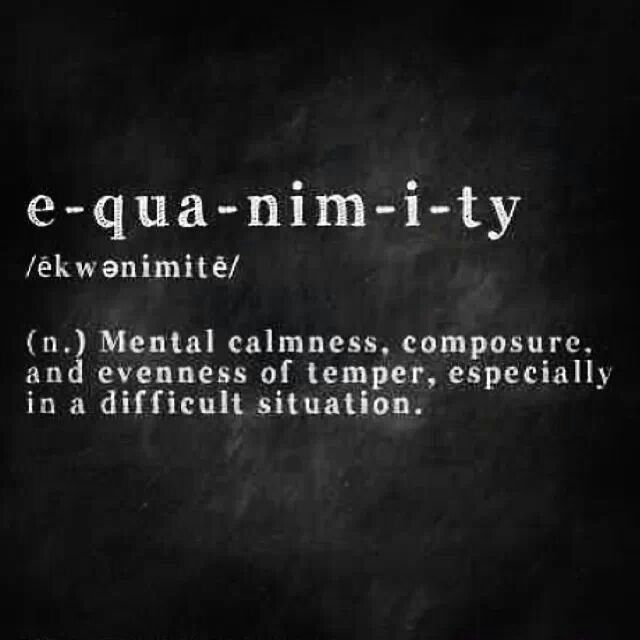Discover The Power Of Equanimity Quotes: Your Path To Inner Peace
In a world filled with chaos and uncertainty, finding inner peace has become more important than ever. Equanimity quotes offer profound wisdom that can guide us toward emotional balance and mental clarity. These timeless sayings provide valuable insights into maintaining composure even in the most challenging situations.
Equanimity, derived from the Latin word "aequus" meaning "equal" and "animus" meaning "mind," represents the ability to remain calm and composed regardless of external circumstances. This quality is highly valued in various spiritual traditions and modern psychology alike. By exploring equanimity quotes, we gain access to ancient wisdom that remains relevant today.
In this article, we will delve deep into the world of equanimity quotes, examining their origins, meanings, and applications in everyday life. Whether you're seeking personal growth or spiritual enlightenment, these quotes can serve as powerful tools for transformation. Let's explore how equanimity can help us navigate life's complexities with grace and resilience.
Read also:Scott Kingsley Swift The Remarkable Journey Of A Rising Football Talent
Table of Contents
- What is Equanimity?
- History of Equanimity
- Famous Equanimity Quotes
- Benefits of Practicing Equanimity
- How to Develop Equanimity
- Equanimity in Daily Life
- Spiritual Perspectives on Equanimity
- Psychological Approach to Equanimity
- Modern Applications of Equanimity
- Conclusion
What is Equanimity?
Equanimity refers to the quality of remaining calm and composed under all circumstances. It is the ability to maintain emotional balance, even in the face of adversity or overwhelming situations. This mental state allows individuals to respond to life's challenges with clarity and wisdom rather than reacting impulsively.
According to psychological research, equanimity is closely linked to emotional regulation and resilience. People who practice equanimity tend to experience lower levels of stress and anxiety, leading to improved overall well-being.
As the Dalai Lama once said, "Happiness is not something ready-made. It comes from your own actions." Similarly, equanimity must be cultivated through consistent practice and mindfulness.
History of Equanimity
Origins in Ancient Traditions
The concept of equanimity has deep roots in various ancient spiritual traditions, including Buddhism, Hinduism, and Stoicism. In Buddhism, upekkha (equanimity) is considered one of the four divine abodes (brahmaviharas), alongside loving-kindness, compassion, and joy.
Hindu texts such as the Bhagavad Gita emphasize the importance of maintaining equanimity in all situations. The Gita states, "One who is not agitated in mind when surrounded by difficulties, whose mind and intellect are firm, is said to be in yoga." This teaching highlights the value of emotional balance in achieving spiritual growth.
In Stoicism, equanimity is referred to as "apatheia," which means freedom from irrational passions. Stoics believe that by controlling our emotions, we can achieve inner peace and live a virtuous life.
Read also:Drakes Wife Unveiling The Truth Behind Drakes Marital Life
Famous Equanimity Quotes
Inspirational Sayings from Thought Leaders
Throughout history, numerous philosophers, spiritual teachers, and thinkers have shared their insights on equanimity. Here are some famous equanimity quotes:
- "The best fighter is never angry." - Lao Tzu
- "Do not be daunted by the enormity of the world's grief. Do justly, now. Love mercy, now. Walk humbly, now. You are not obligated to complete the work, but neither are you free to abandon it." - Rabbi Tarfon
- "Peace is not the absence of conflict, but the ability to cope with it." - Mahatma Gandhi
- "Equanimity is the ground for wisdom and freedom, for love and compassion." - Jack Kornfield
These quotes remind us that equanimity is not about avoiding difficulties but about approaching them with wisdom and grace.
Benefits of Practicing Equanimity
How Equanimity Enhances Well-Being
Practicing equanimity offers numerous benefits for both mental and physical health:
- Reduces stress and anxiety
- Improves emotional regulation
- Enhances decision-making abilities
- Promotes resilience in challenging situations
- Fosters deeper connections with others
A study published in the Journal of Positive Psychology found that individuals who practice equanimity tend to experience greater life satisfaction and overall happiness. By cultivating this quality, we can create a more peaceful and fulfilling life for ourselves and those around us.
How to Develop Equanimity
Practical Steps for Cultivating Inner Peace
Developing equanimity requires consistent practice and dedication. Here are some practical steps to help you cultivate this valuable quality:
- Practice mindfulness meditation daily
- Engage in self-reflection to identify emotional triggers
- Develop a gratitude practice to shift focus from negative to positive
- Practice compassion toward yourself and others
- Seek guidance from experienced teachers or mentors
By incorporating these practices into your daily routine, you can gradually build the strength and resilience needed to maintain equanimity in all situations.
Equanimity in Daily Life
Applying Equanimity to Real-World Challenges
Equanimity is not just a theoretical concept; it can be applied to everyday situations to improve our interactions and decision-making. For example:
- In workplace conflicts, equanimity allows us to respond thoughtfully rather than react emotionally.
- During family disagreements, maintaining equanimity helps prevent escalation and promotes understanding.
- When facing personal setbacks, equanimity enables us to learn from our experiences without becoming overwhelmed by emotions.
By practicing equanimity in our daily lives, we can transform challenging situations into opportunities for growth and learning.
Spiritual Perspectives on Equanimity
Insights from Various Traditions
Different spiritual traditions offer unique perspectives on equanimity:
- Buddhism emphasizes the importance of detachment from desires and aversions.
- Hinduism teaches that equanimity arises from understanding the divine nature of all beings.
- Christianity encourages patience and long-suffering as expressions of equanimity.
- Islam promotes sabr (patience) as a key virtue that aligns with equanimity.
While these traditions may differ in their approaches, they all agree on the transformative power of equanimity in achieving spiritual fulfillment.
Psychological Approach to Equanimity
Scientific Insights into Emotional Regulation
Modern psychology supports the importance of equanimity in maintaining mental health. Research shows that individuals who practice equanimity exhibit:
- Improved cognitive functioning
- Enhanced emotional resilience
- Lower levels of stress-related illnesses
A study conducted by the University of Wisconsin-Madison found that mindfulness meditation, which cultivates equanimity, leads to increased activity in the prefrontal cortex, the part of the brain associated with emotional regulation.
Modern Applications of Equanimity
Equanimity in the Digital Age
In today's fast-paced world, equanimity is more relevant than ever. With constant distractions from technology and social media, maintaining focus and composure has become increasingly challenging. However, by applying equanimity principles, we can:
- Reduce digital overload and improve productivity
- Enhance communication skills in virtual environments
- Cultivate meaningful connections despite physical distance
As technology continues to evolve, equanimity serves as a guiding principle for navigating modern life with wisdom and grace.
Conclusion
Equanimity quotes provide invaluable insights into achieving emotional balance and mental clarity. By understanding the history and significance of equanimity, we can apply its principles to our daily lives for greater well-being and fulfillment. Whether through spiritual practices or psychological approaches, cultivating equanimity offers transformative benefits that extend beyond personal growth.
We invite you to share your thoughts and experiences with equanimity in the comments below. How have these quotes impacted your life? What steps are you taking to develop equanimity? Your input can inspire others on their journey toward inner peace.
For further reading, explore our collection of articles on mindfulness, meditation, and personal development. Together, let's create a more peaceful and harmonious world, one moment at a time.

